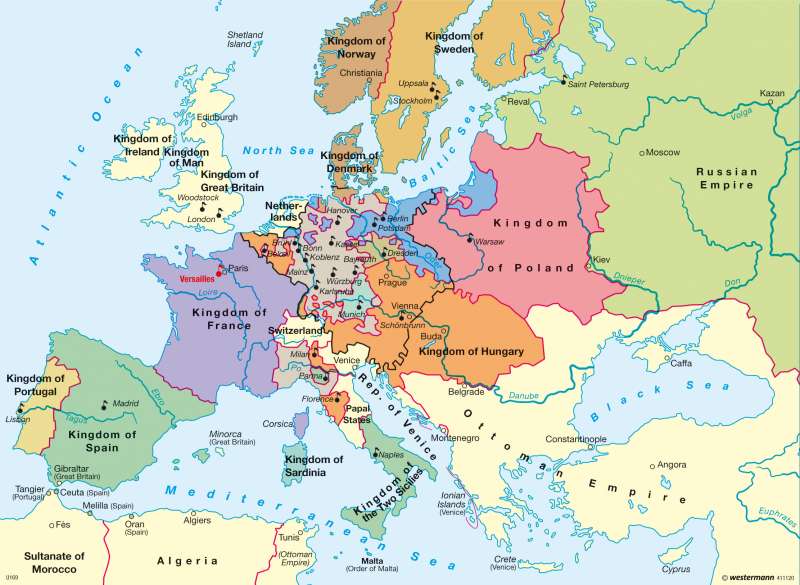Absolutism in Europe circa 1740
Europe - The modern age
978-3-14-100790-9 | Page 33 | Ill. 3

Information
The early modern era in Europe from 1570 to 1848 was marked by a succession of wars. It was also a period during which the Church was compelled to relinquish position of absolute authority. Subjects became citizens, society was progressively modernized, economies were rationalized and scientists and artists accomplished milestone achievements.The Age of Absolutism
Europe found itself circa 1740 in the midst of an era of wars waged in the struggle for power in Europe and Germany. The War of Spanish Succession between the Bourbons and the Habsburgs (which began in 1701 and became a European war) ended in 1713/14 with the Peace of Utrecht und the Treaty of Rastatt. King Philipp V of the House of Bourbon was forced to renounce all claims to succession to French throne in return for recognition as King of Spain. The Spanish Netherlands, Milan and Florence were ceded to Austria and the Habsburgs. The British received colonial holdings in North America from France as well as Gibraltar and Menorca from Spain. They were also awarded a monopoly on the slave trade with the American colonies. Prussia was granted part of Obergeldern and the Principality of Neuenburg along with recognition as a kingdom. Prussia also acquired West Pomerania somewhat later during the Great Northern War under Frederick William I. The Habsburgs were forced to cede Naples and Sardinia to the Spanish Bourbons in 1735 and lost Lorraine as well after the War of Polish Succession.
Frederick II acceded to the throne of Prussia in 1740, and Maria Theresia assumed the reins of government in the Archduchy of Austria and the Kingdom of Bohemia and Hungary at the tender age of twenty-three. Following the death of Emperor Charles VI, the father of Maria Theresia, Bavaria, Spain and Saxony attempted with the support of the French to assert claims to succession. Frederick II took advantage of the opportunity and advanced into Silesia (First Silesian War). Shortly thereafter, Saxon and French-Bavarian troops invaded Bohemia, while Spanish forces launched an attack on Italy, thereby initiating the War of Austrian Succession (which lasted until 1748). After occupying Silesia, Frederick II elevated Prussia to the status of European superpower. Under the terms of the Peace of Dresden, which brought an end to the Second Silesian War (1744/45), Maria Theresia was forced to relinquish all claims to Silesia. By signing the Peace of Aachen (1748), she ceded Piacenza and Parma in northern Italy but retained Austria's claim to the lands inherited by the Habsburgs.
With very few exceptions (Great Britain and Ireland, the Netherlands, Switzerland, the Republic of Venice, the Vatican) the Christian nations of Europe had come under absolutist rule by about 1740.
The characteristics of absolutism
An important feature of absolutism is the ruler's claim to undivided power over the state. Absolutism inherited the legacy of the feudal system and created the foundation for the modern national and administrative state. Its most important characteristic was the political neutralization of the nobility, which was compensated with the award of military and diplomatic offices and pacified with generous pensions and annuities but was also irrevocably disempowered. A centralized bureaucracy emerged. Civil servants were compelled to cover the immense and increasing financial needs of the court and the nation's standing army by pursuing an economic policy that combined government control with the promotion of export, commerce and agriculture (mercantilism) in order to achieve a positive trade balance and raise the income of the state. This early form of absolutism reached its climax under the rule of the French Sun King Louis XIV. However, his reign (1661?1715) ended with the bankruptcy of the state as a result of the high costs of war. Still, his palace in Versailles became a model for numerous baroque palaces in Europe.
K. Lückemeier, E. Astor; Ü: J. Southard




